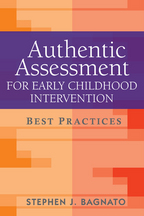Authentic Assessment for Early Childhood Intervention
Best Practices
Stephen J. Bagnato
Foreword by Rune J. Simeonsson
2. How Can Authentic Assessment Prevent the Mismeasure of Young Children?
3. What Are the Foundations for Authentic Assessment of Typical and Atypical Early Development?
4. What are the Best Contexts for Authentic Assessment?
5. Can Professionals "Test without Tests" for Authentic Assessment?, with Richard LeVan
6. How Does Authentic Curriculum-Based Assessment Work?
7. Can Clinical Judgments Guide Parent–Professional Team Decision Making for Early Intervention?, with Eileen McKeating-Esterle
8. How Can We Effectively Assess for Severe Disabilities?, with Pamela S. Wolfe and Richard Kubina
9. How Can We Do Functional Behavioral Assessment with Preschoolers?, with Richard Kubina, Pamela S. Wolfe, and Devender R. Banda
10. What Are Proper Approaches to Detect, Classify, and Intervene for Temperament and Self-Regulatory Behavior Problems in Young Children?
11. How Should We Forecast and Plan for Kindergarten Transition and Early School Success?, with Kimberly A. Blair
12. How Can Authentic Program Evaluation Document Early Childhood Intervention Outcomes?
Synopsis and Conclusions: What Are the Essential Best Practice Guidepoints for Authentic Assessment of Preschool Children?
Appendices



